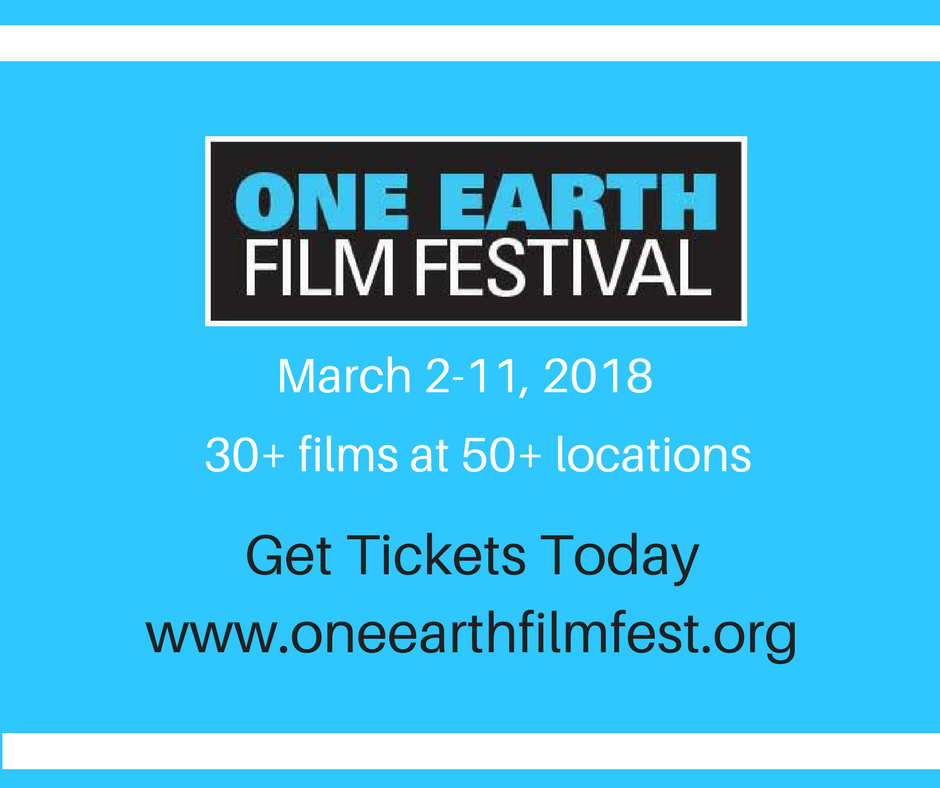 The Festival is showing environmental-focused films throughout the Chicago region through mid-March. Entry is free, with a $7 suggested donation.
The Festival is showing environmental-focused films throughout the Chicago region through mid-March. Entry is free, with a $7 suggested donation.
Check out the full film schedule here: https://www.oneearthfilmfest.org/films-by-date/
 The Festival is showing environmental-focused films throughout the Chicago region through mid-March. Entry is free, with a $7 suggested donation.
The Festival is showing environmental-focused films throughout the Chicago region through mid-March. Entry is free, with a $7 suggested donation.
Check out the full film schedule here: https://www.oneearthfilmfest.org/films-by-date/
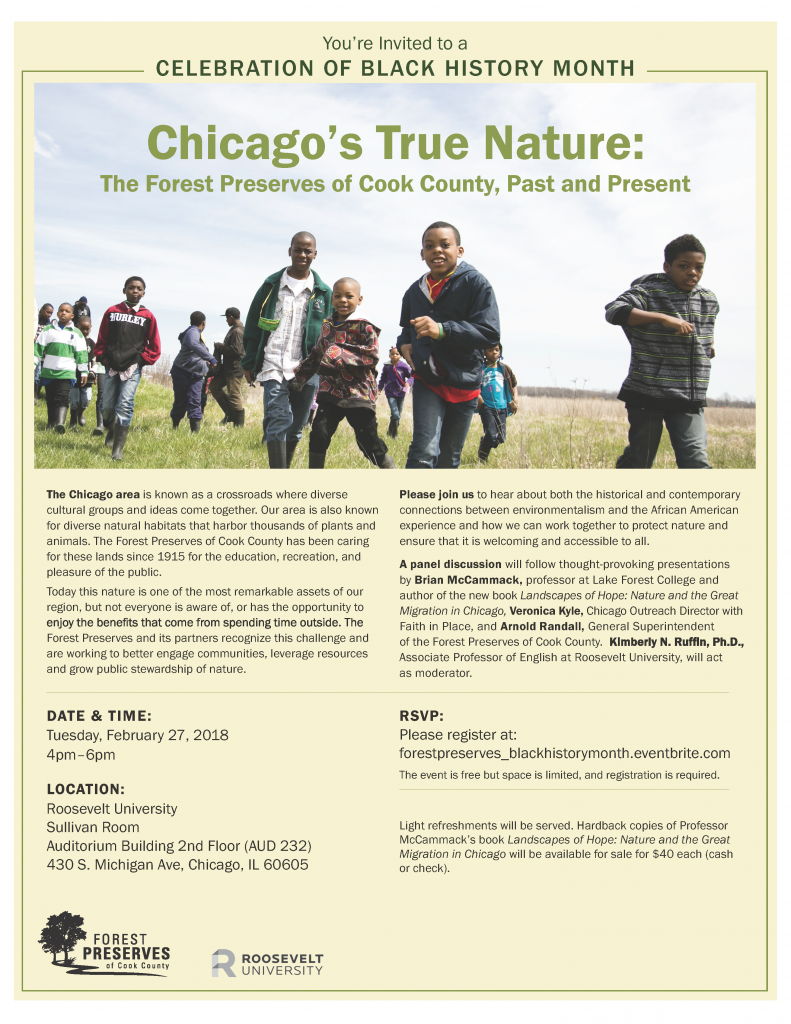 DATE & TIME:
DATE & TIME:
Tuesday, February 27, 2018
4pm –6pm
LOCATION:
Roosevelt University
Sullivan Room
Auditorium Building 2nd Floor (AUD 232)
430 S. Michigan Ave, Chicago, IL 60605
RSVP:
Please register at:
forestpreserves_blackhistorymonth.eventbrite.com
You’re Invited to a Celebration of Black History Month!
The Chicago area is known as a crossroads of diverse cultural groups and ideas. Less commonly known, is the biological diversity of our region. Varied ecosystems are home to native plant and animal species thriving within the Forest Preserves of Cook County.
With nearly 70,000 sprawling acres of wild and wonderful wilderness, the Forest Preserves is a regional asset which improves our quality of life, but not everyone is aware of or has the opportunity to enjoy the benefits that come from spending time outside. The Forest Preserves and its partners recognize the challenge of ensuring that everyone has access to nature and are working to better engage communities of color and grow public stewardship of nature.
Please join us to hear about both the historical and contemporary connections between environmentalism and the African American experience and how we can work together to protect nature and ensure that it is welcoming and accessible to all.
A panel discussion will follow thought-provoking presentations by Brian McCammack, professor at Lake Forest College and author of the new book Landscapes of Hope: Nature and the Great Migration in Chicago, Veronica Kyle, Chicago Outreach Director with Faith in Place, and Arnold Randall, General Superintendent of the Forest Preserves of Cook County. Kimberly N. Ruffin, Ph.D., Associate Professor of English at Roosevelt University, will act as moderator.
Light refreshments will be served. Hardback copies of Professor McCammack’s book Landscapes of Hope: Nature and the Great Migration in Chicago will be available for sale for $40 each (cash or check).
The event is free but space is limited, and registration is required. For directions and transportation information please visit www.roosevelt.edu/campuses/maps-directions
This event is co-sponsored by Roosevelt University and the Forest Preserves of Cook County.
Speaker Bios and Abstracts:
Veronica Kyle directs all of Faith in Place’s Chicago outreach programs, with a particular passion for those related to Sustainable Food and Land Use. She is responsible for the creation of the Migration & Me Program which came about as the result of the realized concern that there were not enough people of color, mainly brown and black people, who were visibly engaged in available extracurricular outdoor activities, stewardship, and Earth care.
Brian McCammack is the author of Landscapes of Hope: Nature and the Great Migration in Chicago (Harvard University Press, 2017) and Assistant Professor of Environmental Studies at Lake Forest College, where he teaches courses on environmental history and politics. Landscapes of Hope recently won the 2018 George Perkins Marsh Prize for best book in environmental history from the American Society for Environmental History. In Landscapes of Hope, he examines the deep connections to nature that black Chicagoans forged in the first half of the twentieth century. The Forest Preserves of Cook County were particularly notable in this regard because African Americans not only sought out leisure there despite racial segregation and intimidation, but the labor of young black men in the Civilian Conservation Corps also helped improve and even build areas like the Skokie Lagoons.
Arnold Randall is the General Superintendent of the Forest Preserves of Cook County. The Forest Preserves of Cook County, established over a century ago, is one of the oldest and largest urban conservation districts in the United States, managing nearly 70,000 acres of diverse habitat across Cook County and offering recreation and education programs for audiences of all ages and from all walks of life. But preserving nature today in the nation’s second largest county comes with its own particular challenges – a lack of funding, climate change, and an urban population often out of touch with nature. The Forest Preserves is actively working with partners to provide a variety of programs that link diverse and urban populations with nature, including a Conservation Corps job training program and robust camping program at five new campgrounds.
Kim Ruffin is an Associate Professor of English at Roosevelt University, author of Black on Earth: African-American Ecoliterary Traditions (U. of Georgia Press, 2010), and nature-loving Certified Forest Therapy Guide.
A week before the Chicago Climate Community Forum was held on 3 Dec 2017 at the Field Museum, I was fortunate to participate in the filming of the newly released Chicago Agreement on Climate & Community, which debuted at the forum attended by over 2,000 people last Sunday. Here’s the video, which brings to life the text of the Agreement.
The Agreement is a living document which you can read, provide feedback on, and sign (if you so wish) yourself and/or on behalf of an organization. Please share this video and the Chicago Community Partnership website with people you know as we build a movement to mitigate climate change here throughout the Chicago region.
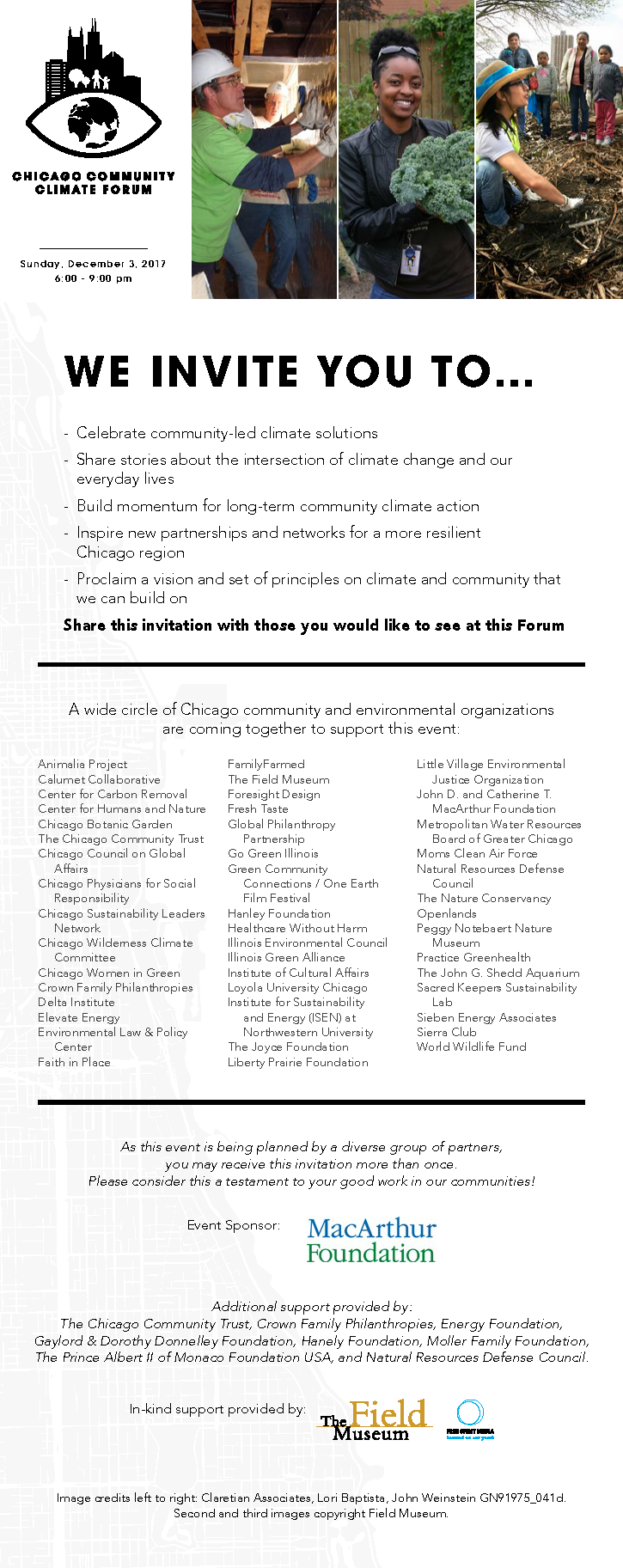 pdf version
pdf version
 I’m honored to deliver a guest faculty lecture at this event today at Roosevelt University. Please come and engage in a meaningful conversation about how food insecurity is prevalent and relates to our community while you learn more about issues of hunger, sustainability and how you can help. Please register for the event here.
I’m honored to deliver a guest faculty lecture at this event today at Roosevelt University. Please come and engage in a meaningful conversation about how food insecurity is prevalent and relates to our community while you learn more about issues of hunger, sustainability and how you can help. Please register for the event here.
 Sponsored by the Black Student Union and the RU Counseling Center, the Oxfam Hunger Banquet provides a chance for us to address the severity of food insecurity and starvation as it relates to our community, and will assist in fostering a community of care that will allow us to join in the fight against inequality, injustice, and oppression. Oxfam is a global organization working to end the injustice of poverty.
Sponsored by the Black Student Union and the RU Counseling Center, the Oxfam Hunger Banquet provides a chance for us to address the severity of food insecurity and starvation as it relates to our community, and will assist in fostering a community of care that will allow us to join in the fight against inequality, injustice, and oppression. Oxfam is a global organization working to end the injustice of poverty.
This fall semester, students in my SUST 220 Water class have been studying our American obsession with bottled water, which comes at the expense of (among other things) proper investment in and maintenance of public drinking water infrastructure. While taxpayer-funded repairs to underground water infrastructure are expensive and politically unpopular, the bottled water industry continues to thrive and grow: the International Bottled Water Association reported industry wholesale revenues of more than $14.2 billion in 2015 alone.
The Chicago Region is blessed with one of the best drinking water sources in the world: Lake Michigan, which supplies water to 163 Chicago-area communities.
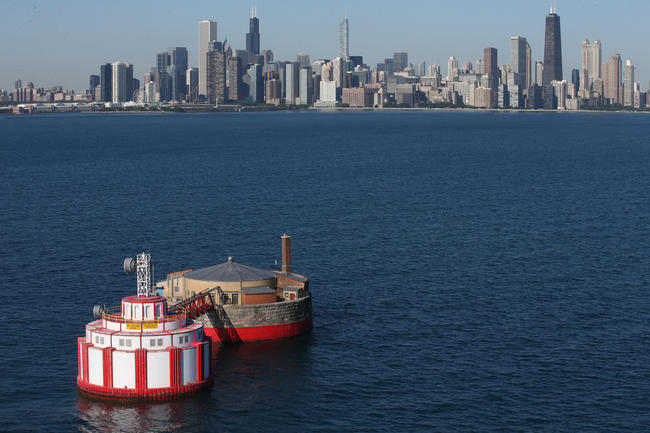
But as this important investigative report published online in the Chicago Tribune reveals, billions of gallons of treated drinking water are wasted each year, while communities pay millions of $ for water that never reaches their taps. Meanwhile, wide disparities in drinking water rates, combined with differential amounts of waste via leaks, disproportionately saddle poor and minority communities with extra costs they cannot afford.
Thus does neglected urban infrastructure meet environmental injustice in 21st century America, here along the southern rim of Lake Michigan.
Sources:
Patrick M. O’Connell, Cecilia Reyes, Ted Gregory and Angela Caputo. (25 Oct 2017). Billions Lost, Millions Wasted: Why Chicago-area Residents Pay Millions for Water that Never Reachers Their Taps. Chicago Tribune. Retrieved from
http://graphics.chicagotribune.com/news/lake-michigan-drinking-water-rates/loss.html.
——. (25 Oct 2017). Same Lake, Unequal Rates: Why Our Water Rates Are Surging — and Why Black and Poor Suburbs Pay More. Chicago Tribune. Retrieved from http://graphics.chicagotribune.com/news/lake-michigan-drinking-water-rates/index.html.
This fall 2017 semester I am teaching two linked sections of SUST 350 Service & Sustainability. The Chicago-based section (01) will meet in AUD 825 the first week of class (Tues 8/29) at 10am and subsequently off-campus at Eden Place Nature Center on Chicago’s South Side (4417 S. Stewart in the Fuller Park neighborhood). Starting week 2, we will convene at 9:30am in the WB Lobby and walk to the Red Line’s Harrison Stop. Eden Place is a half-mile walk from the 47th Street stop. Street parking is also readily available at the Nature Center for anyone traveling by car.
The online section (98) officially starts on 11 Sept 2017. However, students in that section are encouraged to participate in the 8/29 introductory session via Zoom video-conference. The session will also be recorded and archived on the course Bb site for the reference of students who have a scheduling conflict for 8/29.
Login information for the 350 Zoom session is as follows:
For more information on this unique course, see this detailed preview page.
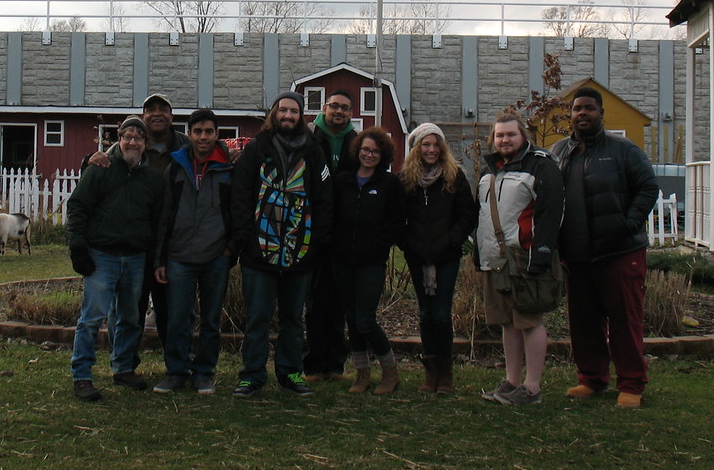
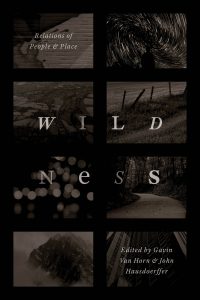 This March saw the publication of the new book Wildness: Relations of People and Place, edited by Gavin Van Horn and John Hausdoerffer (Univ. of Chicago Press, 2017), an environmental humanities project sponsored by the Center for Humans and Nature. Part 3 of the book, entitled Urban Wild, includes an essay I co-wrote with Mr. Michael Howard, a Chicago community leader, conservationist, and environmental educator: “Cultivating the Wild on Chicago’s South Side: Stories of People and Nature at Eden Place Nature Center.”
This March saw the publication of the new book Wildness: Relations of People and Place, edited by Gavin Van Horn and John Hausdoerffer (Univ. of Chicago Press, 2017), an environmental humanities project sponsored by the Center for Humans and Nature. Part 3 of the book, entitled Urban Wild, includes an essay I co-wrote with Mr. Michael Howard, a Chicago community leader, conservationist, and environmental educator: “Cultivating the Wild on Chicago’s South Side: Stories of People and Nature at Eden Place Nature Center.”
I’m fortunate to have been part of this wonderful project, which began with a writer’s retreat in September of 2014 in Crested Butte, CO, featuring writing workshops by the award-winning scientist and nature writer, Robert Michael Pyle (whose own essay follows a poem by none other than the legendary Gary Snyder). My interviews and writing sessions with Mr. Howard at Eden Place in 2015, and the three semesters I’ve worked there with my students each fall since 2014, have made getting a sense of this special place in the world an immensely gratifying experience. Thanks to Gavin and John for shepherding this project through its publication!
From the book’s promo page on the Univ. of Chicago Press website:
Whether referring to a place, a nonhuman animal or plant, or a state of mind, wild indicates autonomy and agency, a will to be, a unique expression of life. Yet two contrasting ideas about wild nature permeate contemporary discussions: either that nature is most wild in the absence of a defiling human presence, or that nature is completely humanized and nothing is truly wild.
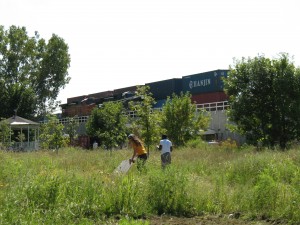
This book charts a different path. Exploring how people can become attuned to the wild community of life and also contribute to the well-being of the wild places in which we live, work, and play, Wildness brings together esteemed authors from a variety of landscapes, cultures, and backgrounds to share their stories about the interdependence of everyday human lifeways and wildness. As they show, far from being an all or nothing proposition, wildness exists in variations and degrees that range from cultivated soils to multigenerational forests to sunflowers pushing through cracks in a city alley. Spanning diverse geographies, these essays celebrate the continuum of wildness, revealing the many ways in which human communities can nurture, adapt to, and thrive alongside their wild nonhuman kin.
From the contoured lands of Wisconsin’s Driftless region to remote Alaska, from the amazing adaptations of animals and plants living in the concrete jungle to indigenous lands and harvest ceremonies, from backyards to reclaimed urban industrial sites, from microcosms to bioregions and atmospheres, manifestations of wildness are everywhere. With this book, we gain insight into what wildness is and could be, as well as how it might be recovered in our lives—and with it, how we might unearth a more profound, wilder understanding of what it means to be human.
Visit the Center for Humans and Nature’s Wildness website for upcoming events and a series of related short films, including one of Michael Howard and Michael Bryson talking about Eden Place.
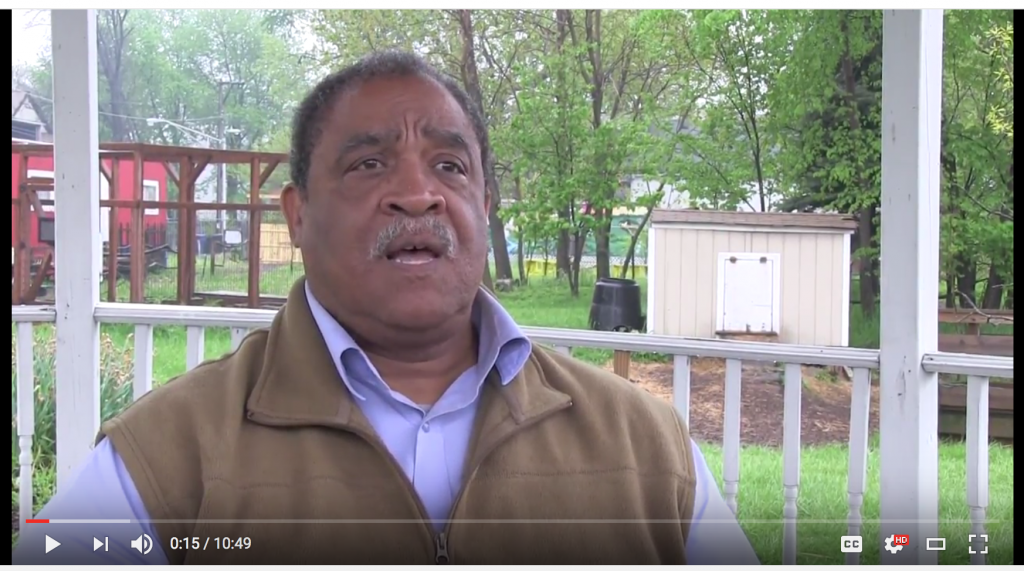 Click on the image above to go to the video interview of Michael Howard (pictured) and Michael Bryson at Eden Place Nature Center.
Click on the image above to go to the video interview of Michael Howard (pictured) and Michael Bryson at Eden Place Nature Center.
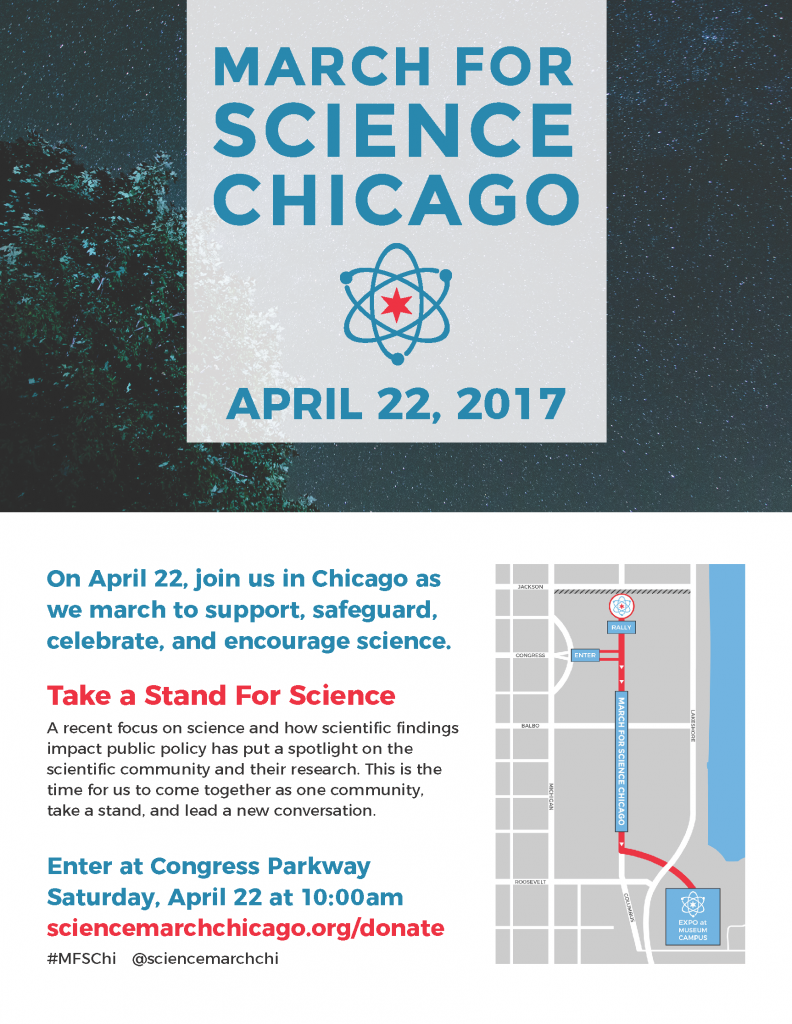 Join faculty and students from Roosevelt’s SUST program and the Department of Biology, Chemistry, and Physical Science as we in the RU community march for science! We’ll meet in the WB Lobby at 9:00am, after which we’ll walk over to Grant Park in time for the 10am rally that kicks off the day’s events. After a round of speakers, participants will march at 11am from Grant Park to the Museum Campus for a cool science expo planned for 12-3pm outside the Field Museum. Official visitor and registration details here.
Join faculty and students from Roosevelt’s SUST program and the Department of Biology, Chemistry, and Physical Science as we in the RU community march for science! We’ll meet in the WB Lobby at 9:00am, after which we’ll walk over to Grant Park in time for the 10am rally that kicks off the day’s events. After a round of speakers, participants will march at 11am from Grant Park to the Museum Campus for a cool science expo planned for 12-3pm outside the Field Museum. Official visitor and registration details here.